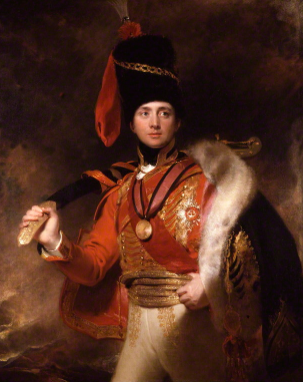Charles William Stewart, 3rd Marquess of Londonderry (1778-1854)
Charles William Stewart, 3rd Marquess of Londonderry, was a British soldier, diplomat, and politician who played a significant role in the military and diplomatic affairs of the United Kingdom during the early 19th century. Known for his charismatic personality, military prowess, and diplomatic skills, Stewart's life was a blend of public service, adventure, and social prominence.

Early Life and Military Career
Charles William Stewart was born on May 18, 1778, in Dublin, Ireland, to Robert Stewart, 1st Marquess of Londonderry, and his second wife, Frances Pratt. He was the half-brother of Robert Stewart, 2nd Marquess of Londonderry, famously known as Viscount Castlereagh. Unlike his elder brother, who was more inclined towards politics, Charles William Stewart pursued a career in the military from a young age.
He began his military career in 1794 when he joined the British Army as a cornet in the 6th (Inniskilling) Dragoons. Stewart quickly rose through the ranks, demonstrating both leadership and bravery in various campaigns. He served in the Netherlands during the French Revolutionary Wars and later in Egypt under Sir Ralph Abercromby. His reputation as a capable and daring officer was solidified during these early years.
The Napoleonic Wars
Stewart's military career reached its zenith during the Napoleonic Wars, where he distinguished himself as a cavalry officer. He fought in several key battles, including the Battle of Talavera (1809) and the Battle of Bussaco (1810). His leadership in these engagements earned him a reputation as one of the finest cavalry commanders in the British Army.
In 1812, Stewart was appointed as the Adjutant-General to the British forces in the Iberian Peninsula under the command of the Duke of Wellington. His role was crucial in organizing and overseeing the British cavalry, and he played a significant part in the successful campaigns that eventually led to the defeat of Napoleon's forces in Spain and Portugal.
Diplomatic Career
In addition to his military achievements, Charles Stewart also had a notable diplomatic career. In 1813, he was appointed British Minister to Prussia, where he worked to strengthen the alliance between Britain and the Prussian Kingdom against Napoleon. His diplomatic efforts contributed to the coordination of military strategies among the allied forces, which played a key role in Napoleon's eventual defeat.
Following Napoleon's abdication in 1814, Stewart attended the Congress of Vienna as part of the British delegation led by his half-brother, Viscount Castlereagh. The Congress of Vienna was a critical moment in European history, as it sought to redraw the map of Europe and establish a new balance of power after the Napoleonic Wars. Although Stewart's role was secondary to that of Castlereagh, his experience and connections were valuable assets during the negotiations.
Marriage and Personal Life
Charles Stewart's personal life was as eventful as his military and diplomatic careers. In 1804, he married Lady Catherine Bligh, the daughter of the 3rd Earl of Darnley. The marriage was short-lived, as Lady Catherine died in 1812, leaving Stewart a widower.
In 1819, Stewart married Lady Frances Anne Vane-Tempest, one of the wealthiest heiresses in the British Isles. This marriage brought him immense wealth and social standing, as Lady Frances Anne inherited vast estates in County Durham and Ireland. The couple's combined wealth and influence allowed them to live a life of grandeur, and they became prominent figures in British high society.
The Marquessate and Later Life
In 1822, following the death of his half-brother, Robert Stewart, Charles William Stewart inherited the title of Marquess of Londonderry, becoming the 3rd Marquess. With the title, he also inherited the responsibilities of managing the family estates and continuing the legacy of the Londonderry family.
As the 3rd Marquess of Londonderry, Charles William Stewart focused on his estates and political affairs. He was a strong advocate for agricultural improvement and industrial development, particularly in the coal mines owned by the Londonderry family in County Durham. Under his management, the family estates prospered, and he became known as a forward-thinking landowner.
Stewart also continued to serve in various political roles, including as Lord Lieutenant of County Down and as a representative peer for Ireland in the British House of Lords. His political views were conservative, and he was a staunch supporter of the British monarchy and the established social order.
Death and Legacy
Charles William Stewart, 3rd Marquess of Londonderry, died on March 6, 1854, at the age of 75. His death marked the end of an era for the Londonderry family, but his legacy lived on through his descendants, who continued to play significant roles in British society and politics.
Stewart's life was a testament to the values of duty, honor, and service. As a soldier, diplomat, and politician, he contributed to some of the most important events of his time. His military achievements during the Napoleonic Wars, his diplomatic efforts in Prussia and Vienna, and his stewardship of the Londonderry estates all underscored his commitment to his country and family.
Despite being overshadowed in history by his more famous half-brother, Viscount Castlereagh, Charles William Stewart's contributions to British history remain significant. He embodied the spirit of the British aristocracy during a period of great change and turmoil, and his legacy is reflected in the enduring influence of the Londonderry family in British society.
External links
The National Portrait Gallery - Charles William Vane-Stewart
